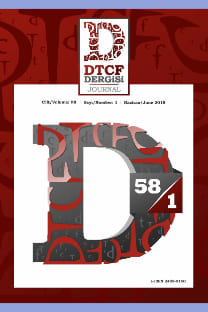PLATON'UN ŞÖLEN'İNDE EROS, ERDEM VE EĞİTİM İLİŞKİSİ
THE RELATIONS OF EROS, VIRTUE, AND EDUCATION IN PLATO'S SYMPOSIUM
___
- Blondell, Ruby. “Where is Socrates on the ‘Ladder of Love’?” Plato’s Symposium: Issues in Interpretation and Reception. Ed. J. H. Lesher, Debra Nails ve Frisbee C. C. Sheffield. Cambridge: Harvard University Press, 2006. 147-178.
- Brisson, Luc. “Agathon, Pausanias, and Diotima in Plato’s Symposium: Paiderastia and Philosophia.” Plato’s Symposium: Issues in Interpretation and Reception. Ed. J. H. Lesher, Debra Nails ve Frisbee C. C. Sheffield. Cambridge: Harvard University Press, 2006. 229-251.
- Corrigan, Kevin ve Elena Glazov-Corrigan. Plato’s Dialectic at Play: Argument, Structure, and Myth in the Symposium. Pennsylvania State University Press, 2004.
- Demos, Raphael. “Eros.” The Journal of Philosophy 31. 13 (1943): 337-345.
- Destrée, Pierre. “How Does Contemplation Make You Happy? An Ethical Reading of Diotima’s Speech.” Plato’s Symposium: A Critical Guide. Ed. Pierre Destree ve Zina Giannopoulou. Cambridge University Press, 2017. 216-234.
- Dover, Kenneth J. Greek Homosexuality. Cambridge: Harvard University Press, 1989.
- Ferrari, Giovanni R. F. “Platonic Love.” The Cambridge Companion to Plato. Ed. Richard Kraut. Cambridge University Press, 1992. 248-276.
- Grube, George M. A. Plato’s Thought. Indianapolis: Hackett Publishing Company, 1980.
- Halperin, David M. One Hundred Yerars of Homosexuality: And Other Essays on Greek Love. New York: Routledge, 1990.
- Hunter, Richard. Plato’s Symposium, New York: Oxford University Press, 2004. Lamascus, Lorella D. The Poverty of Eros in Plato’s Symposium, Bloomsbury Publishing, 2016.
- Platon. Şölen. Çev. Azra Erhat ve Sabahattin Eyuboğlu. İstanbul: Remzi Kitabevi, 1998.
- Piscitelli, Emile J. In praise of Love: A Conversation with Plato’s Symposium. PublishAmerica, 2006.
- Reeve, C. D. C. “Plato on Eros and Friendship.” A Companion to Plato. Ed. Hugh H. Benson. Blackwell Publishing, 2006. 294-307.
- Reid, Jeremy. “Unfamiliar Voices: Harmonizing the Non-Socratic Speeches and Plato’s Psychology.” Plato’s Symposium: A Critical Guide. Ed. Pierre Destree ve Zina Giannopoulou. Cambridge University Press. 2017. 28-47.
- Rosen, Stanley. Plato’s Symposium. New Haven: Yale University Press, 1987.
- Santas, Gerasimos. Plato and Freud: Two Theories of Love. Basil Blackwell, 1988.
- Sheffield, Frisbee. Plato’s Symposium: The Ethics of Desire. New York: Oxford University Press, 2006.
- Shorey, Paul. What Plato Said. Chicago: The University of Chicago Press, 1933.
- Strauss, Leo. On Plato’s Symposium. Chicago: The University of Chicago Press, 2001.
- Versenyi, Laszlo. Sokrates ve İnsan Sevgisi, Çev. Ahmet Cevizci. Ankara: Gündoğan Yayınları, 1995.
- ISSN: 0378-2905
- Yayın Aralığı: Yılda 2 Sayı
- Başlangıç: 1942
- Yayıncı: Ankara Üniversitesi Dil ve Tarih-Coğrafya Fakültesi
TANG DÖNEMİNDE HÜKÜMDARLIK ORDUSU: SUWEI BİRLİĞİ VE ESİR BEYZADELER
KÂMİL KAHRAMAN “MECNÛN”DAN HAREKETLE SEYR-İ SÜLÛK, BİREYLEŞME SÜRECİ VE MONOMİTİN ÇEKİRDEĞİ
DEĞİŞMEKTE OLAN İRLANDA VE İRLANDALI KİMLİĞİ: CONOR MCPHERSON'IN “THE WEIR” ADLI OYUNU
ROBOTLARIN YÜKSELİŞİ: IAN MCEWAN'IN “BENİM GİBİ MAKİNELER” ROMANINDA ETİK SORUNLARIN İNCELENMESİ
JOHN CHRISTOPHER'IN “EMPTY WORLD” ROMANI ÜZERİNE NİETZSCHECİ BİR DEĞERLENDİRME
EDEBİYATTAN BEYAZ PERDEYE TÜR BELİRLEYİCİ KİŞİLER
RUSÇANIN KELİME HAZNESİNİN ÖĞRETİMİNDE SEMASYOLOJİK VE ONOMASYOLOJİK YAKLAŞIMLAR
YENİLENEBİLİR ENERJİNİN ÖNEMİ VE LATİN AMERİKA COĞRAFYASINDAKİ YERİ: BREZİLYA ÖRNEĞİ
KAZUO ISHIGURO'NUN “BİR AİLE YEMEĞİ” BAŞLIKLI ÖYKÜSÜNDE PİNTERESK ÖĞELER
ALASDAIR GRAY'İN “THE FALL OF KELVIN WALKER” ADLI ROMANINDA MEKÂN TEMSİLLERİ
